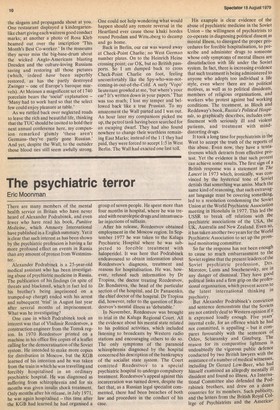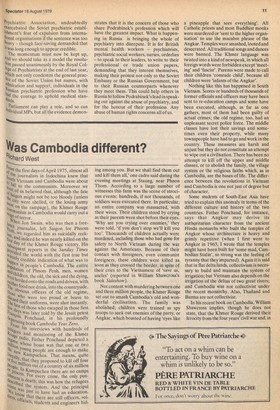The psychiatric terror
Eric Moonman
There are many members of the mental health service in Britain who have never heard of Alexander Podrabinek, and even fewer who have read his book, Punitive Medicine, which Amnesty International have published in a English summary. Yet it is clear that such interest as has been shown by the psychiatric profession is having a far more profound effect on events in Russia than any amount of protest from Westminster.
Alexander Podrabinek is a 25-year-old medical assistant who has been investigating abuse of psychiatric medicine in Russia. The publication of his findings (in spite of threats and blackmail, which in fact led to his brother's being imprisoned on a trumped-up charge) ended with his arrest and subsequent 'trial' in August last year after several months of imprisonment. What was he investigating?
One case in which Podrabinek took an interest was that of Vladimir Rozdestvov, a construction engineer from the Tomsk region. In 1970 Rozdestvov printed on a machine in his office five copies of a leaflet calling for the democratisation of the Soviet system. He intended to make more copies for distribution in Moscow, but the KGB learned of his intention and he was taken from the train in which he was travelling and forcibly hospitalised in an ordinary psychiatric hospital. He was diagnosed as suffering from schizophrenia and for six months was given insulin shock treatment. Only months after his release, in July 1971, he was again hospitalised — this time after the KGB had learned he had organised a group of seven people. He spent more than four months in hospital, where he was treated with neuroleptic drugs and intramuscular injections of sulfazin.
After his release, Rozdestvov obtained employment in the Moscow region. In September 1977 he was taken to the Kaluga Psychiatric Hospital where he was subjected to forcible treatment with haloperidol. It was here that Podrabinek endeavoured to obtain information about Rozdestvov's diagnosis, treatment and reasons for hospitalisation. He was, however, refused such information by Dr Tropina, the doctor treating Rozdestvov, Dr Bondareva, the head of the particular section of the hospital, and Dr Panasenko, the chief doctor of the hospital. Dr Tropina did, however, refer to the question of Rozdestvov's mental illness as 'debatable.'
In November, Rozdestvov was brought to trial in the Kaluga Regional Court. All the evidence about his mental state related to his political activities, which included listening to broadcasts by Western radio stations and encouraging others to do so. The only symptoms of the paranoid schizophrenia diagnosed by the hospital concerned his description of the bankruptcy of the socialist state system. The Court comitted Rozdestvov to a special psychiatric hospital to undergo compulsory treatment. Rozdestvov's appeal against this incarceration was turned down, despite the fact that, as a Russian legal specialist commented, there had been breaches of both law and procedure in the conduct of his case. Psychiatric Association, undoubtedly e.xarcebated the Soviet psychiatric establishment's fear of expulsion from internattlonal organisations if the sentence was too aeavy — though face-saving demanded that n Was long enough to appear credible.
The momentum must now be kept up, and we should take as a model the resolu!am passed unanimously by the Royal ColLege of Psychiatrists at the end of last year, Which not only condemns the general practlee of the Soviet Union but names, with admiration and support, individuals in the Ilassian psychiatric profession who have ,O the courage to uphold medical stanuards.
, Parliament can play a role, and so can individual MPs, but all the evidence demon strates that it is the concern of those who share Podrabinek's profession which will have the greatest impact. What is happening in Russia is bringing the whole of psychiatry into disrepute. It is for British mental health workers — psychiatrists, psychiatric social workers, nurses, orderlies — to speak to their leaders, to write to their professional or trade union papers, demanding that they interest themselves, making their protest not only to the Soviet Embassy or the Russian Government, but to their Russian counterparts whenever they meet them. This could help others in Russia to follow Podrabinek's lead in speaking out against the abuse of psychiatry, and for the honour of their profession. Any abuse of human rights concerns all of us. a pineapple that sees everything', All Catholic priests and most Buddhist monks were murdered or 'sent to the higher organisation' to use the macabre phrase of the Angkar.Temples were smashed, looted and desecrated. All traditional songs and dances were banned. The Khmer language was twisted into a kind of newspeak, in which all foreign words were forbidden except 'meeting' and 'fascist'. Parents were made to call their children 'comrade child', because all children were 'infants of the Anglcar'.
Nothing like this has happened in South Vietnam. Scores or hundreds of thousands of former officials and officers may have been sent to re-education camps and some have been executed, although, as far as one gathers, most of them had been guilty of actual crimes; the old regime, too, had an unpleasant secret police force. The middle classes have lost their savings and sometimes even their property, while many townspeople have had to go and work in the country. These measures are harsh and unjust but they do not constitute an attempt to wipe out a civilisation. There has been no attempt to kill off the upper and middle classes, or to abolish the family, the village system or the religious faiths which, as in Cambodia, are the bases of life. The difference between the revolutions in Vietnam and Cambodia is one not just of degree but of character.
Some students of South-East Asia have tried to explain this anomaly in terms of the different culture and history of the two countries. Father Ponchaud, for instance, says that Angkor may derive its authoritarian character from the ancient Hindu monarchs who built the temples of Angkor whose architecture is heavy and grimly repetitive (when I first went to Angkor in 1963, I wrote that the temples might have been built for 'some mad, Cambodian Stalin', so strong was the feeling of tyranny that they imparted). Again it is said that in flat delta lands, collectivism is necessary to build and maintain the system of irrigation; but Vietnam also depends on the irrigation of the deltas of two great rivers; and Cambodia was not collectivist under the recent monarchy. Also, Thailand and Burma are not collectivist.
In his recent book on Cambodia, William Shawcross implies, though he does not state, that the Khmer Rouge derived their ferocity from the four years' civil war and, in































 Previous page
Previous page